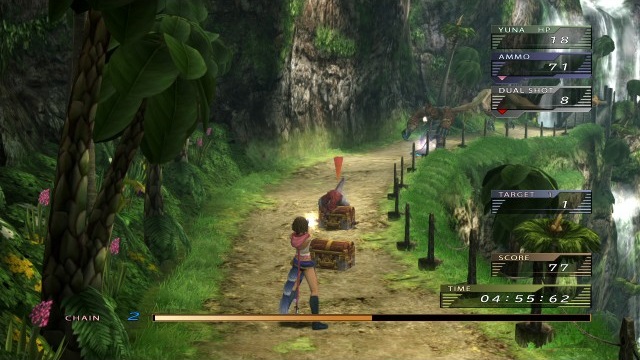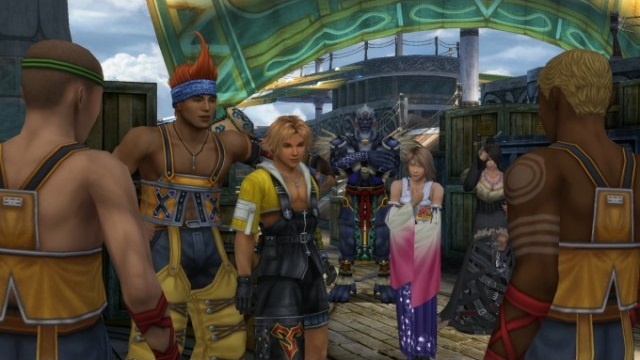Just to remind you that there isn't a remastered version for Final Fantasy VII.
Let’s get down to the nitty-gritty. Final Fantasy X/X-2 HD Remaster features a lot of bonus content in addition to the HD remaster of the visuals of the original games. The soundtrack has been rearranged and remastered for high definition audio, an audio drama plays over the end credits, it now has trophy support, and features a video called Eternal Calm set between the two games. It includes the International editions of the games, with more aeons and an “expert” sphere grid for Final Fantasy X; and more dress spheres, the Pokémon-like Creature Creator, and an additional epilogue X-2 mission called The Last Mission for Final Fantasy X-2.
You can’t argue that Final Fantasy X/X-2 HD Remaster, as the name implies, looks significantly better than the source material. The original FFX game (2001), though a jump in fidelity from the Playstation One games—particularly Final Fantasy VIII, with its more realistic character designs—had all kinds of problems with clipping errors and weird effect transparency issues. In one scene near the climax of the game, you could see the floor behind the character through his mouth, which is almost comical.
The remaster largely fixes these, the textures and the general technical issues that slightly marred the upgraded visual fidelity of the series. The original title was also the first Final Fantasy game to boast voice-acting, and as such has certain, um, issues of performance and storytelling (the laughing scene, anyone?) that the remaster doesn’t address. Nor does it adapt any of the movement or facial animation to contemporary standards.
It’s interesting to revisit Final Fantasy X long past the hype of its accomplishments as what was a much anticipated next-gen title, and to see what it was on the long road of Final Fantasy games. As a piece of design, it’s a fascinating archeological jump forward in game development. There are moments when it is still inspirationally beautiful with breathtaking environments. However, as a game it doesn’t hold up particularly well and is extremely dated in a way that a number of prior Final Fantasies aren’t.
Many of the issues that people complained about in Final Fantasy XIII are present: corridor environments, half-baked characters, poor vocal performances, and an emphasis on beautiful cut-scenes over enjoyable gameplay. Additionally it has some anachronisms the developers didn’t fix in the remaster, like the necessity of save points, random encounters, the incredible stiffness of the animations, etc.
Still, Final Fantasy X isn’t all bad. Its sphere-grid leveling system gives the player a lot of autonomy in how they fill out each character’s skills and abilities, combat is fluid, and the ability to switch in a character at will means utilizing the best characters for the job when you need them. The turn-based combat also gives you a preview of who’s next in combat, so you can pick which enemies to target in order to create a tactical advantage. Overdrives, FFX’s version of limit breaks, are in the form of different quick-time events that help make them more interesting.
But the writing had started to be on the wall for the Final Fantasy series as early as Final Fantasy VIII. Fan disapproval of the incredibly apathetic Squall Lionheart led Square Enix executives to demand that all Final Fantasy leads be “happy” for successive games, and series creator Hironobu Sakaguchi was already on the way out following the failure of Final Fantasy: The Spirits Within, eventually leaving to form Mistwalker Studios. Final Fantasy X stands as a turning point where you could see the series heading towards the nadir that is Final Fantasy XIII. Though its story is still comprehensible, the gameplay and characters are less compelling. The ending, like that of the prior two games, feels shallowly and hastily constructed.
By Final Fantasy X’s release in 2001, in just four scant years since FFVII, the numbered Final Fantasy series had gone from being one of the greatest story-based franchise in video gaming, to slowly becoming the video game version of LOST. Even Final Fantasy XII, developed by a completely different team in an already established setting (the Final Fantasy Tactics and Vagrant Story world of Ivalice) suffered from such pressure from the top that the original director had to quit due to illness, and what emerged is the most bizarre remake of Star Wars ever to hit video game shelves. Seriously, that game is Star Wars set in Ivalice with a cute rabbit girl instead of Chewbacca (and, again, terrible voice acting).
Final Fantasy X-2, on the other hand is kind of like a Charlie’s Angels-era McG got control of the franchise. It’s almost deliberately wacky and is a bizarre mix of early 90’s flashy cinematic comedy and brightly colored zest. It also solidifies Square’s inability to move beyond trying to recapture the success of Final Fantasy VII, by establishing Final Fantasy X-2 as a prequel with the progenitor of the Shinra corporation as a prominent side character. It’s also the first sequel to a numbered Final Fantasy series, that helped establish (for good or bad) that each numbered single-player title was franchise-able.

X-2’s design has a more comprehensive and complete feeling than its progenitor, but it also takes itself much much less seriously. This is clear from its pop-idol opening in which you chase a Yuna impostor, who’s stolen her identity to make money as as pop-idol diva. Though the story eventually settles into a “world in peril” plot, its jazz soundtrack and pop-art feel never really goes away. It also features an open map with non-linear play progression, a nice change of pace from the super-linear X.
X-2 also hosts significant advances in production value in general, and this shows in the HD remaster. Its environments looks better than those in X in just about every way, and character animations are smoother and more expressive (the game won an AIAS award for Outstanding Achievement in a Character Performance in 2004 for the English version of Rikku). It's just feels more fun. If X begins to solidify how Final Fantasy began to slide into mediocrity, then X-2 shows how less pressure on the games to fit certain targets allowed creativity to flourish (something you also see in the non-numbered Kingdom Hearts series’ entries).
Unlike Final Fantasy X, combat in X-2 features an active battle timer, a class system (dress spheres), an on-the-fly switch between classes (garment grid) during combat, and is generally much faster-paced and more dynamic. You can see how X-2’s garment grid paved the way for XIII’s battle system with the garment-grid class-change system. The game also features a Pokémon-like system of creature capture and development, where the creatures can sub in for the main characters in combat.

Chances are, Final Fantasy X fans have already bought Final Fantasy X/X-2 HD Remaster, and I have invited their ire with a largely negative review of that game. But for non-fans or the curious, I don’t recommend the game except for those anachronistically curious about a world of grinding, constant random battles, and a shoehorned- happy-go-lucky protagonist whose storyline fits a more sullen one. It was a giant step forward at the time, but it just doesn’t hold up under scrutiny anymore, compared to advances in contemporary RPG gameplay.
Final Fantasy X-2 holds up significantly better, though it does still have a few annoyances. Its design much more satisfying, the story and characters are more consistent, and the performances and gameplay are better. Even if it’s fundamentally different from the original Final Fantasy X game that many loved, it actually emerges as a more engaging title.
-
The games look significant better
-
Final Fantasy X does not hold up well at all
-
Final Fantasy X-2 still feels fresh
-
The reskinning doesn't fix design problems
-
International versions have bonus content







